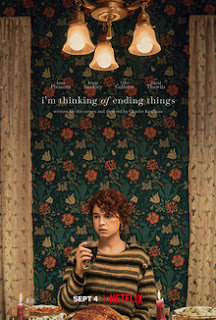I'm Thinking Of Ending Things
The imagination of Charlie Kaufman is well known to movie-goers, as his screenplays bended reality and his first directorial effort, Synecdoche, New York challenged viewers with an almost in penetrable plot. That is true with his latest, streaming on Netflix, I'm Thinking Of Ending Things, which ends with a foray into David Lynch country, reminding me of Mulholland Drive.
The plot is deceptively simple. A couple, dating for just a few weeks, takes a road trip to his parents' farmhouse. But the voiceover narration by the woman, Jessie Buckley, begins with the title, "I'm thinking of ending things." Does she mean the relationship, or her own life? The first twenty minutes or so, as well as another large chunk of the film, is her and the man, Jesse Plemons, conversing in the car, a bold choice, since it's a very static shot. But these conversations are engrossing.
When they get to the house, the hallucinatory aspects of the film kick into gear. Throughout the night, Plemons' parents, Toni Collette and David Thewlis, change in age, from middle age to advanced age and dementia. Buckley does not seem to notice. Also we hear several versions of the truth. Buckley is referred to by several different names, and studying several different subjects. Two versions of how she and Plemons met are told. Her paintings, shown to the parents on her phone, turn up in their basement, painted by other artists, and she finds a copy of a poem she recited in a book in Plemons' childhood room.
Buckley is eager to leave, as a blizzard is raging. They stop at an ice cream stand, and this encounter is pure Lynch, as a young girl with a rash over her arms vaguely warns Buckley of something. Then the film goes completely surreal when they visit Plemons' high school. The characters seem to slip into an otherworld, where duplicates dance a ballet, and the janitor has a mental breakdown, stripping naked and following a spectral, talking pig into the school (earlier Plemons tells a gruesome story about the demise of pigs on his parents' farm).
Nothing is resolved, and we are left to interpret this for ourselves. Was any of this real, or just Buckley's hallucination. One of the major topics in the film is time--Buckley suggests that we do not pass through time, but time passes through us. Audiences who need to be spoon-fed will likely find this film too confusing, but I think it's daring and challenging.
The performances, particularly by Buckley, are amazing. I don't know if their will be an Oscar ceremony this year, but she deserves a nomination. Plemons is also good, a seemingly mild-mannered nerd who can be driven to rage. He reminded me of Philip Seymour Hoffman, who would have played this part at the same age.
Charlie Kaufman is an original, and everyone of his films, as writer or director, is worth seeing.



Comments
Post a Comment